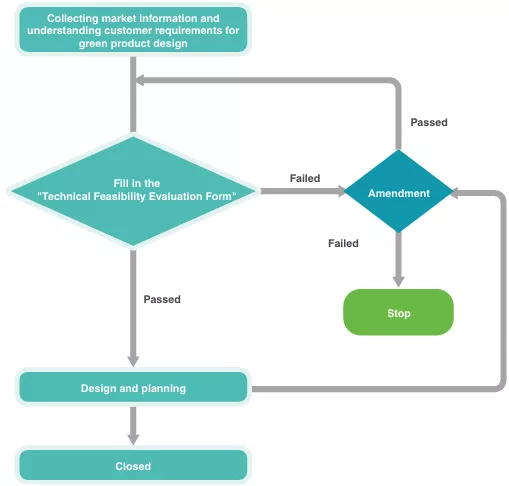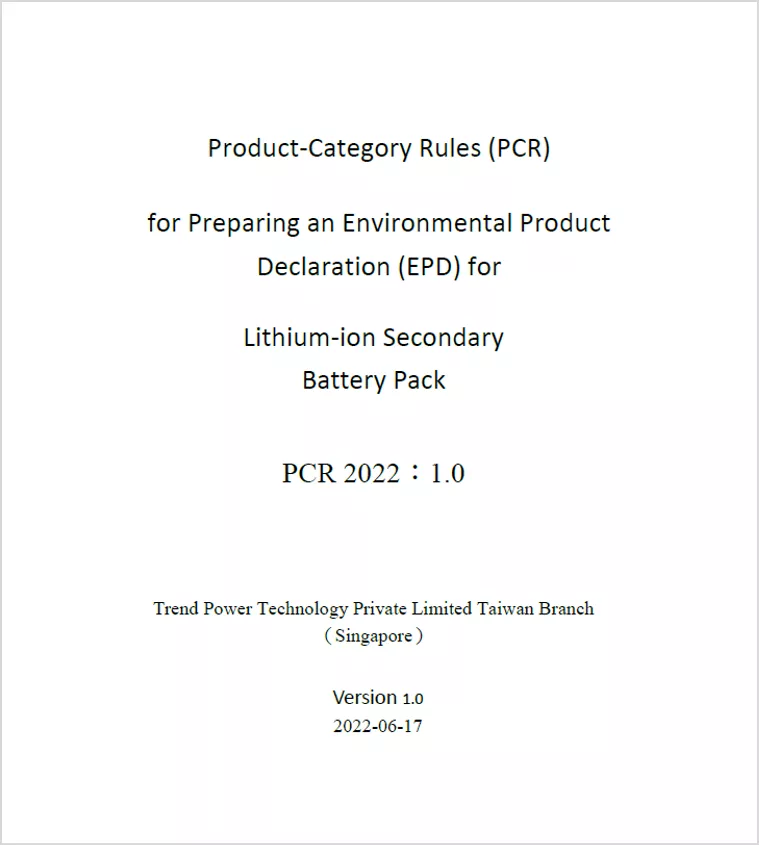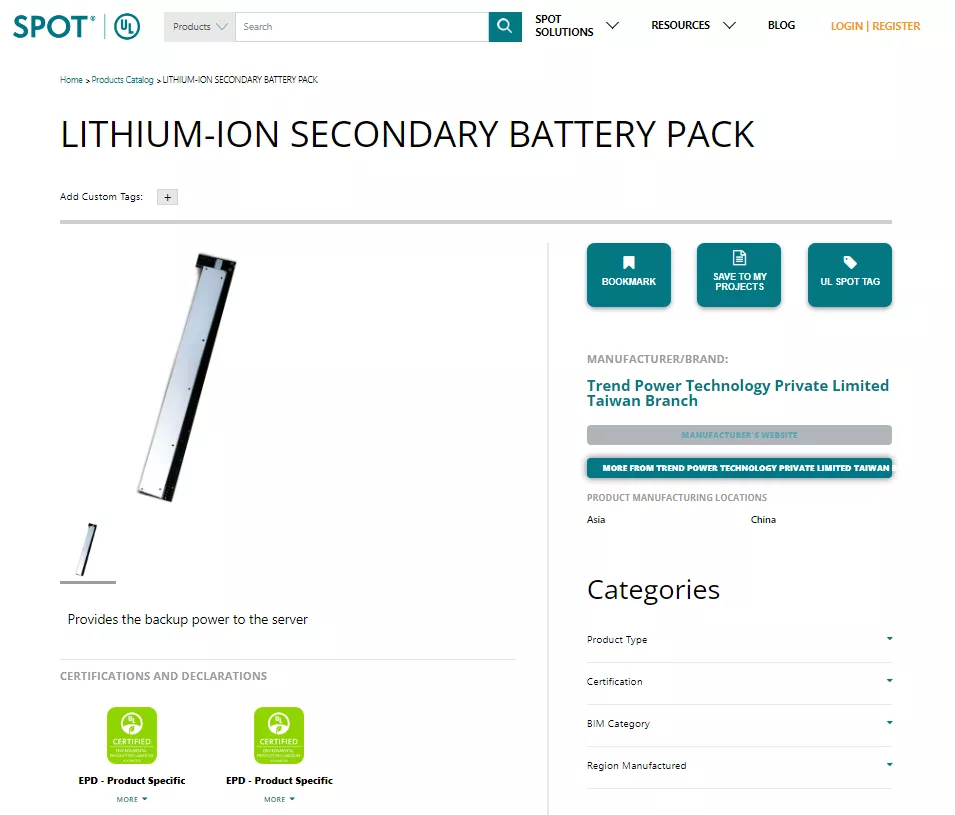Simplo actively plans a full range of carbon management directions. Aside from the GHG inventory, Simplo also follows ISO 14067:2018, using the life cycle assessment (LCA) as the framework for the carbon footprint project for lithium-ion battery modules.
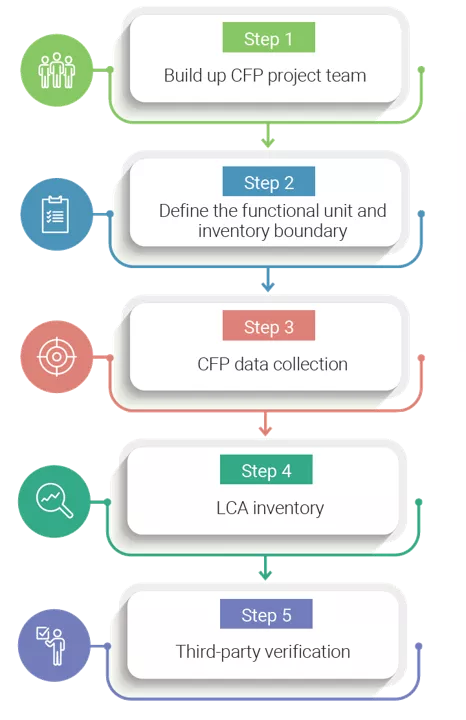
External Verification and Results
To improve the credibility and reliability of the carbon footprint inventory figures for the lithium ion battery pack, the unbiased third-party SGS conducted external verification pursuant to the standards of ISO 14067:2018, and a verification statement was obtained in September 2022. In the results of this product carbon footprint inventory, the carbon emissions of each lithium ion battery pack amounted to 4.88 kg CO2e. It was found that the significant emissions have major hot points at the battery cells in the stage of raw material acquisition (90%). Subsequently, carbon reduction objectives will be established and incorporated into the long-term improvement strategy.
Product-Category Rules (PCR) for Preparing an Environmental Product Declaration (EPD) for Lithium-ion Secondary Battery Pack
Based on the latest report issued by the Intergovernmental Panel on Climate Change (IPCC) of the UN, the greenhouse effect results in climate change and impacts human survival significantly. Product carbon footprints have become a hot issue of great concern for industry. The product carbon footprint refers to the total amount of greenhouse gas emissions throughout the process of acquisition of material, production and manufacturing, distribution, use, and disposal of a product. The disclosure of carbon footprints not only provides information of products, but also a method for finding carbon reduction hot spots.
Simplo subsidiary, Trend Power participated in the establishment of the Lithium-ion Secondary Battery Pack Product Category Rules. The purpose is to have a foundation for consistent comparison for the environmental declaration after quantifying the environmental impacts of products with the same functions. This PCR is applicable to all lithium-ion secondary battery packs produced and manufactured worldwide. The Commodity Classification Codes (CCC Codes) are as follows:
- 85076000107 Mobile battery packs with lithium-ion storage batteries
- 85076000900 Other lithium-ion storage batteries
It is expected that the requirements of this PCR will use the Environmental Product Declaration (EPD) of third category products pursuant to ISO 14025.
Product-Category Rules (PCR) Establishment Process

Stakeholder Meeting
The PCR was established by Trend Power Technology Private Limited Taiwan Branch (Singapore), and the Taiwan Battery Association invited the major manufacturers in Taiwan and the representatives from the stakeholder groups to hold explanation and consulting meetings of stakeholders in Taiwan on May 19, 2022, for public negotiation and discussion.
Expert Review Meeting
The expert review meeting for the PCR of "lithium-ion secondary battery pack" was convened on May 25, 2022.
EPD-PCR Announcement
The new version of "EPD-PCR for Li-ion Secondary Battery Pack" has been announced on the Environmental Footprint Website of the Bureau of Industry. (https://www.idbcfp.org.tw/detail.aspx?nid=2260)
EPD Type III Environmental Declaration
The Environmental Product Declaration (EPD) is based on the characteristics of the product life cycle and provides consumers with quantifiable and comparable environmental performance according to the ISO 14025: Environmental Labels and Declarations. Simplo's subsidiary, Trend Power, formulated the product category rule (PCR) for "Lithium-ion Secondary Battery Pack EPD” in 2022 as a common calculation benchmark for the industry, and at the same time complete the Backup Battery Unit (BBU) module Type III Environmental Declaration, becoming the world's first case of BBU passing third-party EPD verification. (https://spot.ul.com/)
Task 1: Developing industrial environmental declaration standardsA new version of the Lithium-ion Secondary Battery Pack EPD- PCR was completed and announced on the website of the Industrial Development Bureau for environmental footprints. |
Task 2: Conducting product life cycle assessment according to PCRThe quantification of the BBU environmental impact was completed with the third-party UL verification passed (ISO 14025). |
|
|
|
Introduce a Systematic Carbon Footprint Management System
Based on the experience of implementing product carbon footprint ISO 14067 in the past, Simplo Technology has developed its own Product Carbon Footprint System (PCF System). The purpose is to achieve systematic management for disclosing and monitoring the effectiveness of carbon footprint reduction. This system serves as a reference for future reduction efforts and identifies hot spots for reduction.

As a battery module supplier, Simplo Technology collaborates with customers on carbon footprint projects. 2023 to 2024, life cycle inventory (LCI) was conducted on a total of 26 products. The internal Product Carbon Footprint Risk Management Task Force has developed relevant skills to meet the customers' product carbon footprint requirements.
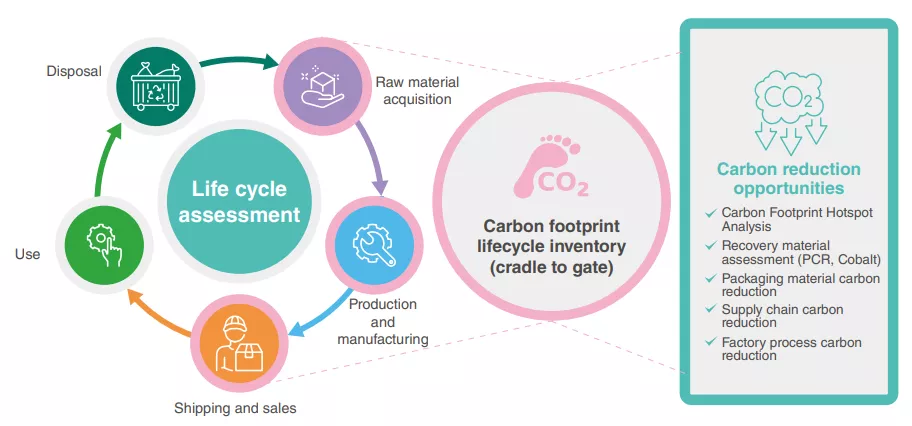
Synergistic effect
Simplo Technology utilized its self-developed PCF system to calculate the carbon footprints (cradle to gate) of 5 products. Depending on the Bill of Materials (BOM) variations among the products, the carbon footprints ranged approximately from 4 to 7 kg CO2e. Analyzing product emission hotspots, the raw material stage accounts for the majority of carbon emissions. The main sources of emissions are PCBs, battery cells, and ICs, which are the top three contributors to total carbon emissions. The carbon emissions are also significantly influenced by difference in PCB weight. In order to continuously reduce the carbon footprints of our products, Simplo Technology integrates environmental design thinking into the product R&D stage, using environmentally friendly materials, improving energy efficiency, and extending the lifecycle, aiming for the development of low-carbon products.Carbon Reduction Opportunities
• Raw material management: Environmentally friendly materials (RoHS, REACH), use of recycled materials (recycled cobalt, recycled plastics)• Green manufacturing: ISO 14001 environmental management system, ISO 14064-1 GHG inventory, ISO 50001 energy management system, UL2799 zero waste to landfill
• Distribution and transportation: Packaging material recycling, green transportation
• Use stage: Product energy consumption, safety during use
• Scrap and recycling: Disassembly, recycling and reuse
Green Design
「Definition of "Design for Environment (DfE)": "Systematically considering the design performance in environmental, health, and safety objectives throughout the entire product and process lifecycle". Also known as green design and environmental design, Simplo Technology employs product lifecycle thinking to constantly enhance product value during the R&D phase. Simultaneously aiming to reduce resource waste and environmental impact, the Company enhances green competitiveness through the development of green products.
In Response to the EU Batteries Regulation
The new EU battery regulation will ensure that future batteries have a low carbon footprint, use the least amount of hazardous substances, support the transition to a circular economy, and enhance the security of raw materials and energy supplies. Simplo Technology has already started the process of identifying and responding to the regulation in detail, and has set up a working group to respond to customer requests.
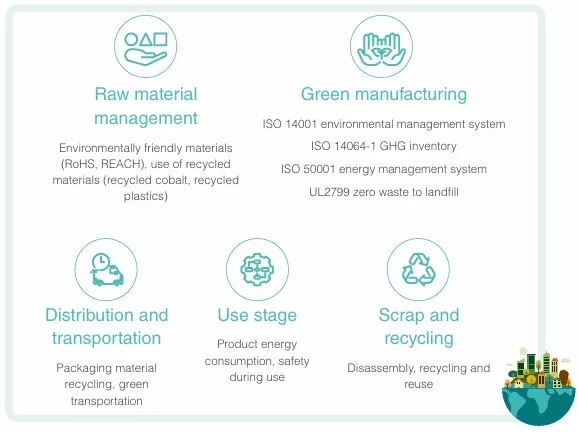
Standardized Process
Simplo Technology introduces the concept of environmental design into its "New Product Development Management Procedure", evaluating the potential environmental impacts of designs at each stage of the lifecycle and proactively addressing them. During the product development process, minimizing negative environmental impacts, continuously researching and incorporating environmentally friendly materials, and innovating to develop low-carbon products, aiming to create products that meet environmental standards.
